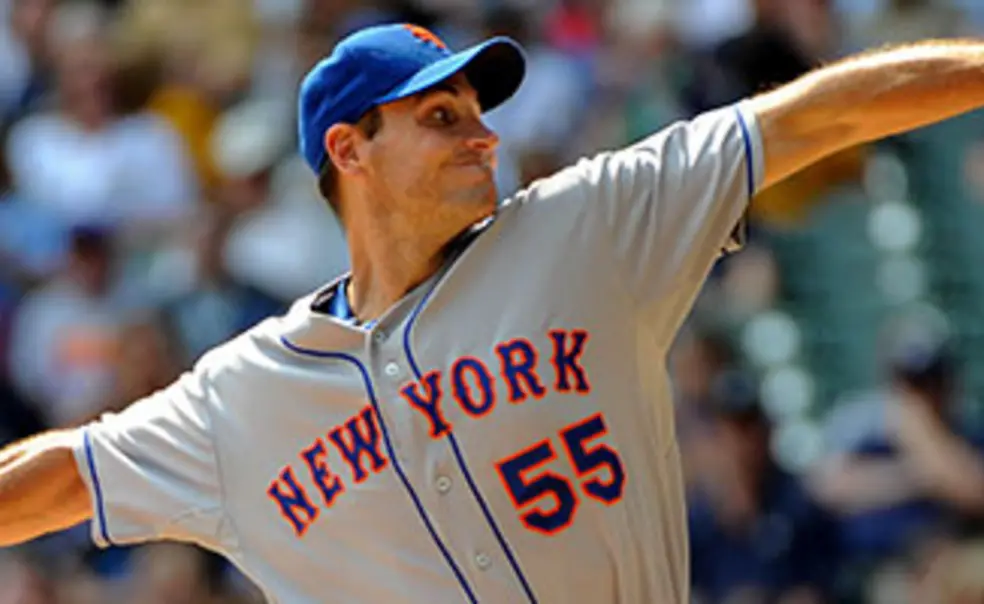Q&A: Chris Young ’02, on Princeton and the Major Leagues
Chris Young ’02 may have had the most remarkable two-year career in the history of Princeton athletics: Starring for the men’s basketball and baseball teams, he was named Rookie of the Year in both sports as a freshman and All-Ivy in both as a sophomore. He signed a pro baseball contract after his sophomore season and reached the majors four years later. In nine seasons, Young has won more games (53) than any other Princeton alumnus, and he was the first Princetonian to play in the All-Star Game, in 2007. Injuries kept Young out of action for much of the 2013 season, but in November, the Washington Nationals re-signed him to a minor league deal. He spoke with PAW a few weeks later, while visiting campus for a Princeton Varsity Club-sponsored panel discussion.
You’ve had several injuries in the last few years. How are you feeling?
I feel really good. I had surgery in June for something called thoracic outlet syndrome, which is essentially a pinched nerve in my right arm. It originates in the neck and runs down the arm. My shoulder feels — knock on wood — the best it’s felt in about five years, so I think they’ve finally found the problem and I’m hopeful that it will lead to good things.
They went in and freed up the nerve, cleared out space, and actually took out part of my first rib to create a little more space in there for the nerve to move. In doing so, it alleviated the pressure that was on the nerve, and essentially the pain in my shoulder is completely gone.
You were the first Princeton major leaguer in more than 20 years when you made your debut in 2004, and since then, there have been a handful of others — Ross Ohlendorf ’05, Will Venable ’05, and David Hale ’11. What has it been like for you to watch other Princeton alumni come into the majors?
It’s really neat, and certainly it’s a unique fraternity that we have. But I think more than anything it’s a tribute to coach [Scott] Bradley, the Princeton baseball program, the Princeton athletic department, and Gary Walters [’67] and the culture and atmosphere they’ve created here. You can get the best education possible and realize your dreams athletically. It’s not one or the other.
Coming to a college in the Northeast and playing basketball in the winter, did you ever worry that playing less baseball would hold you back?
I didn’t think it would hinder me. I did come here with the idea of being a professional athlete in mind. If you’re good enough, it doesn’t really matter where you go — they’ll find you. I also really believe there’s something to be said for being a big fish in a small pond, so to speak. Because of the fewer games played in baseball in the Ivy League schedule, to an extent it can save your arm. Some of these pitchers in college are getting used like professional players, and it can burn them out, lead to injuries, and potentially hinder their professional careers. Whereas here, you play just enough games to develop and get better without overexposing your body to the toll that other players might see in bigger conferences.
And you happened to have a former major-league catcher coaching you.
Absolutely. It was a major part of my decision to come here: coach Bradley’s experience being a major league catcher, and specifically to me, catching Randy Johnson during his career.
When you made your debut with the Rangers, did you envision yourself still being active 10 years later?
My goal was to make a career of this. It wasn’t to get a cup of coffee and be done. I’ve always said I want to play as long as I possibly can. … I’m 34 right now, and I feel like there are still some good years ahead of me.
What do you enjoy most about baseball?
We’re just big kids. We get to play a game for a living. There’s a business to it, but once you’re out on the field competing, it’s what we’ve done our whole lives. To be our age and still be able to do it and get paid to do it — we’re so lucky. I do not have any desire to move onto the next career. That day will come, and when it does, I’ll move on and look forward to it. But for the time being, I still get to be a big kid and have fun doing it.
Princeton fans remember you from basketball as well. Is that part of your training routine?
No, I don’t play anymore. Occasionally, I’ll grab a ball and shoot around a little bit, but I learned early in my baseball career that it was a pretty big risk. I twisted my ankle one time playing [basketball] and realized I can’t take on this risk anymore. I love basketball, and I look forward to the day when I can get back into some pick-up games. But — fortunately — I’m under contract can’t assume that risk at this point.
Looking back at your career, what would you tell your 24-year-old self?
Just enjoy it, make the most of it. … As I’ve gotten older, I’ve realized that the only thing that truly matters is who I am as a person — the character, what I put in, and the effort that I give. … I’m proud of where I’ve gotten, and hopefully, the best is still yet to come.
— Interview conducted and condensed by Brett Tomlinson












No responses yet